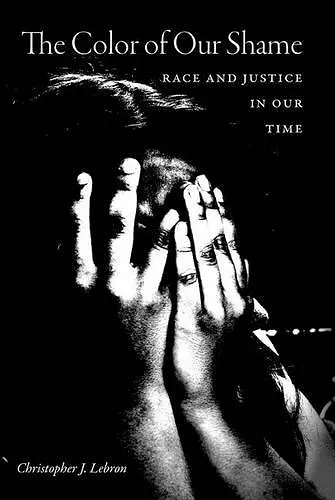The Color of Our Shame
Race and Justice in Our Time
Format:Paperback
Publisher:Oxford University Press Inc
Published:21st May '15
Currently unavailable, and unfortunately no date known when it will be back

For many Americans, the election of Barack Obama as the country's first black president signaled that we had become a post-racial nation - some even suggested that race was no longer worth discussing. Of course, the evidence tells a very different story. And while social scientists are fully engaged in examining the facts of race, normative political thought has failed to grapple with race as an interesting moral case or as a focus in the expansive theory of social justice. Political thought's under participation in the debate over the status of blacks in American society raises serious concerns since the main academic task of political theory is to adjudicate discrepancies between the demands of ideal justice and social realities. Christopher J. Lebron contends that it is the duty of political thought to address the moral problems that attend racial inequality and to make those problems salient to a democratic polity. Thus, in The Color of Our Shame, he asks two major questions. First, given the success of the Civil Rights Act and the sharp decline in overt racist norms, how can we explain the persistence of systemic racial inequality? Second, once we have settled on an explanation, what might political philosophy have to offer in terms of a solution? In order to answer these questions Lebron suggests that we reconceive of racial inequality as a condition that marks the normative status of black citizens in the eyes of the nation. He argues that our collective response to racial inequality ought to be shame. While we reject race as a reason for marginalizing blacks on the basis of liberal democratic ideals, we fail to live up to those ideals - a situation that Lebron sees as a failure of national character. Drawing on a wide array of resources including liberal theory, virtue ethics, history, and popular culture, Lebron proposes a move toward a "perfectionist politics" that would compel a higher level of racially relevant moral excellence from individuals and institutions and enable America to meet the democratic ideals that it has set for itself.
Lebron argues that we lack the 'will to be racially egalitarian' despite our stated commitments. We ignore the moral lessons taught by our institutions and consequently fail to reform those institutions to support development of our moral capacity for racial egalitarianism. Lebron points to an alternative path. His is a terrific and compelling argument."-Danielle S. Allen, author of Talking to Strangers
The Color of our Shame offers a trenchant and sobering indictment of the character of American society. Americans claim to be committed to a principle of equal citizenship, but our public policies systematically treat blacks as of lower worth. Lebron demonstrates the power of virtue theory in coming to grips with our failure to live up to our democratic ideals. This is vital reading for all morally serious Americans."-Elizabeth Anderson, John Rawls Collegiate Professor of Philosophy and Women's Studies, University of Michigan, Ann Arbor
"[The Color of Our Shame] is essential reading for students and scholars of liberalism, democracy and racial inequality. The book weaves moral and political philosophy together with a discussion of US institutions, highlighting the ways in which they sustain and propagate unjust racial formations. It is a compelling book, rich in detail and ambitious in scope. " - Contemporary Political Theory
"In this book, Christopher Lebron … artfully joins Rawlsian-inspired theorizing about social justice with critical race theory's focus on ongoing racial injustice to illuminate what is needed to develop a distinctly political theory of racial justice. In so doing, he also sheds light on the role of popular culture and national character, or civic culture, in perpetuating the gap between venerable American ideals and deplorable American realities. " - Perspectives on Politics
ISBN: 9780190264673
Dimensions: 231mm x 155mm x 18mm
Weight: 340g
224 pages